

Conviso One
Conviso One is the dedicated herbicide for weed control in Conviso Smart sugar beet varieties. Containing two highly effective acetolactate synthase (ALS) inhibiting herbicides.
Product details
Conviso One is a post-emergence broad-spectrum herbicide containing foramsulfuron and thiencarbazone-methyl, two highly active ALS herbicides. It is for use exclusively in ALS-tolerant sugar beet varieties known as Conviso Smart.
Conviso One has a single application rate of 1L/ha and should be applied at the 2-4 true leaf stage of the target weeds. Although able to control a wide range of weeds, fat-hen is likely to be the marker weed in most situations, so application should be timed accordingly. In crop terms, this is likely to be around growth stage 14-18, four to eight true leaves.
It should not be mixed with other herbicides but can be applied in sequence with other non-ALS containing herbicides where non-controlled weeds, such as resistant grassweeds or volunteer potatoes are present. Herbicide uptake is via both leaves and roots with its soil movement influenced by soil moisture status.
Product Profile
Important Information
Excellent and convenient weed control in sugar beet: broad spectrum control of a range of hard-to-treat weeds, including fat-hen, annual mercury and knotgrass
Safe: Outstanding crop safety means the crop can fulfil its yield potential
Robust: lasting control from a single application
A unique opportunity to control weed beet: reduce the weed beet burden without damaging the growing crop
Simple Weed Control
With a single application rate and only one application per crop, weed control could not be any easier. Applied between growth stages 14-18, the typical window of application for Conviso One sits neatly between the timing of the second and third application of a standard programme using non-ALS tolerant varieties. This spreads the workload at one of the busiest times of the crop calendar.
Where non-controlled weeds such as resistant grassweeds or volunteer potatoes need treating, a separate application should be made specifically to treat these weeds. Where non-ALS tolerant varieties are also grown, this application can be timed to coincide with treatments in other beet crops.
Conviso One offers excellent control of a wide range of broad-leaved weeds.
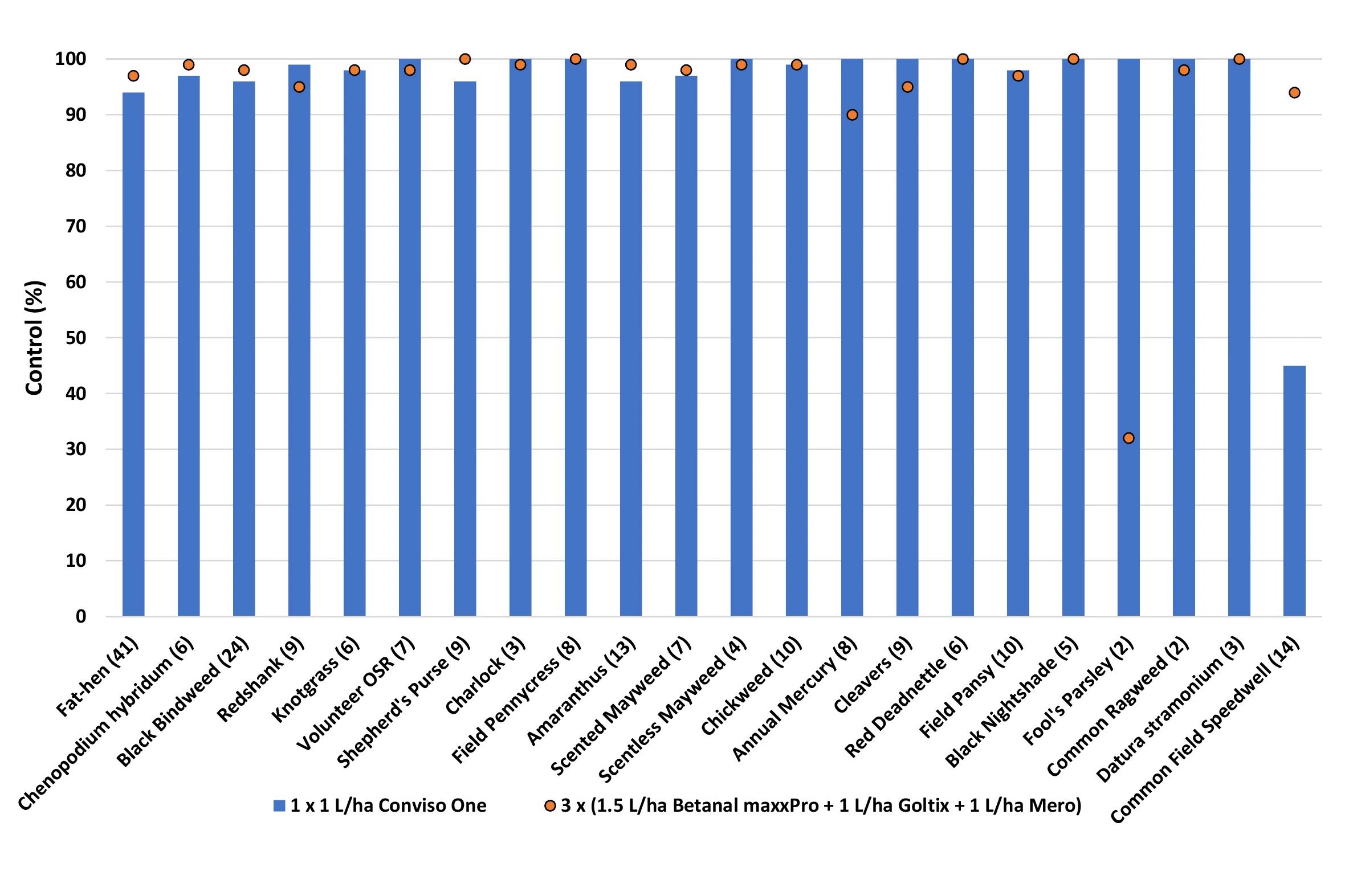
Conviso One offers excellent control of sensitive grassweeds.
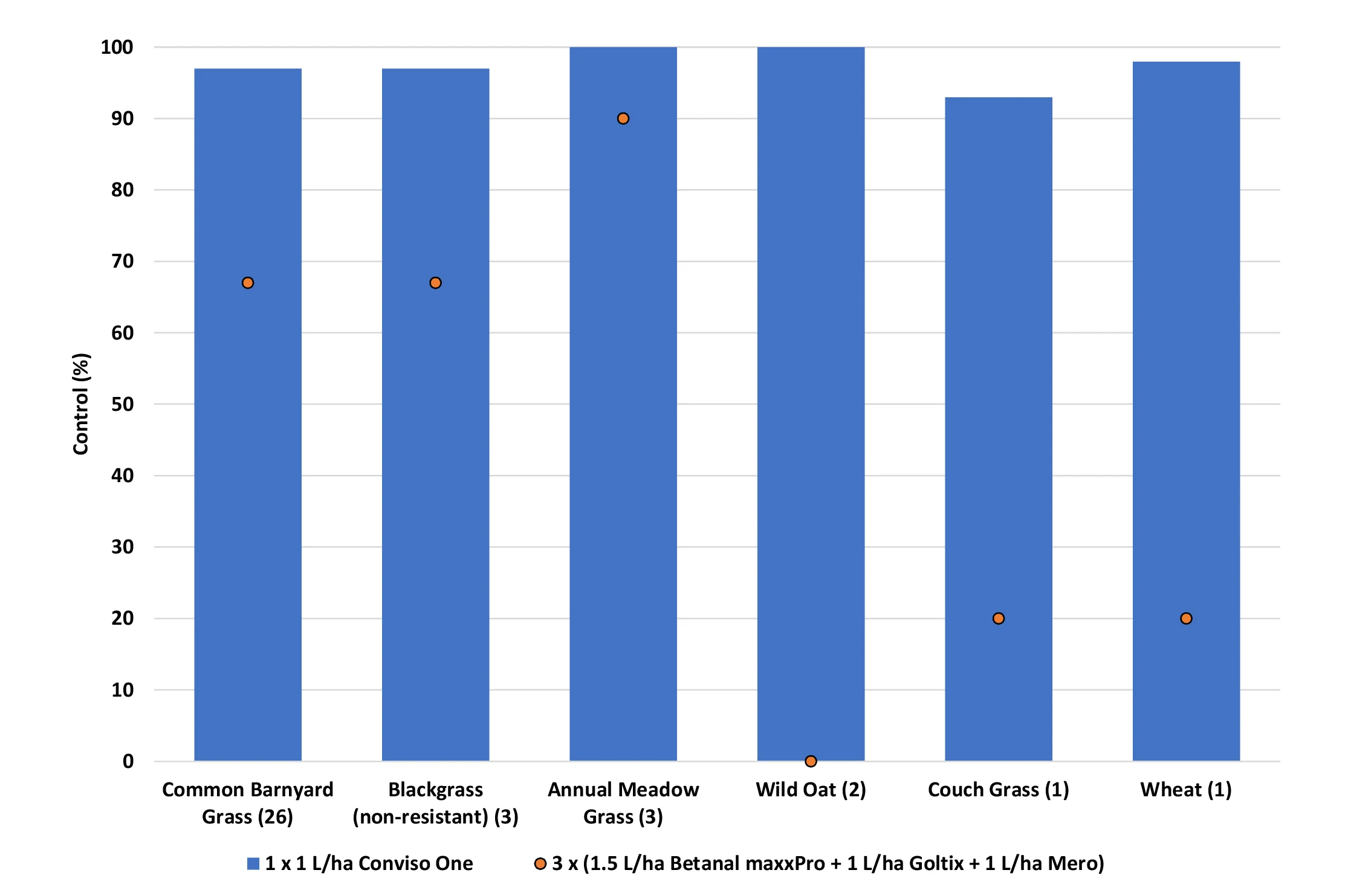
Conviso One gives lasting residual performance
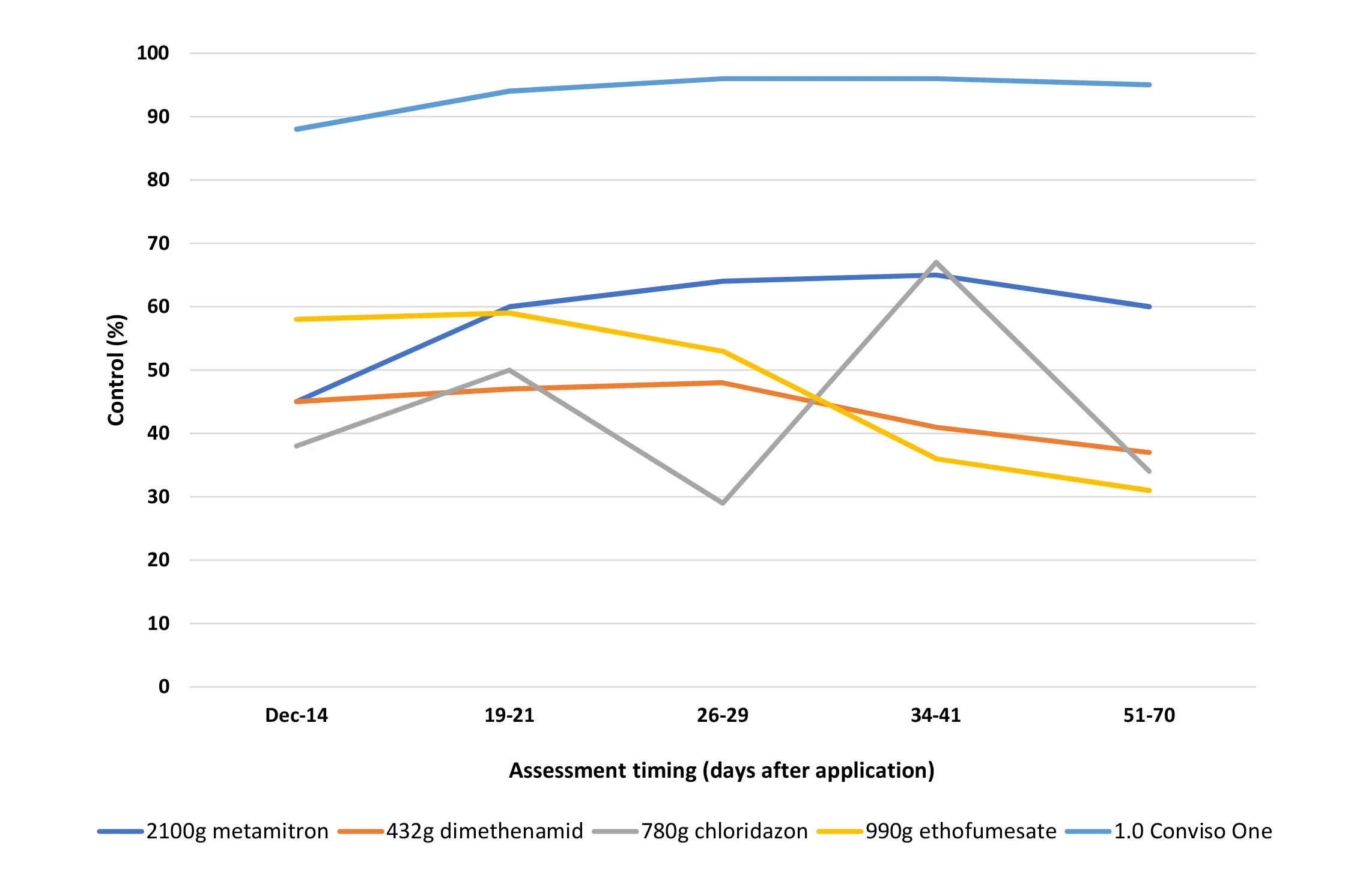
Across five trials spanning Germany, France and Great Britain, application of Conviso One gave better control and for longer than several other residual herbicides used in sugar beet. Weeds controlled included fat-hen, fumitory, mayweed, poppy, common field speedwell and several polygonum species. Persistence will vary depending to soil conditions, temperature and moisture.
Weed beet control
Weed beet can cause significant yield losses and is an unwanted host for pests and disease. It is not possible to control weed beet with classic sugar beet herbicides meaning growers have to rely on mechanical or manual weeding which is both costly and time consuming.
By adopting the Conviso Smart system growers have a unique opportunity to reduce the weed beet burden resulting from non-Conviso Smart varieties with a single application of the Conviso One herbicide.
Conviso One has been developed using classic breeding techniques such as those utilised in the introduction of rhizomania resistance and nematode tolerance.
All plants need to form specific amino acids to grow. Conviso One works by binding with the ALS enzyme preventing the substrate from attaching to it. Unable to produce essential amino acids, the target weed dies. Conviso Smart varieties contain a naturally occurring tolerant enzyme that prevents the Conviso One herbicide from binding to it meaning it can continue producing essential amino acids and grow naturally.
More than 1.5 billion cells were screened to locate this naturally occurring tolerance. It formed the basis for the Conviso Smart system.
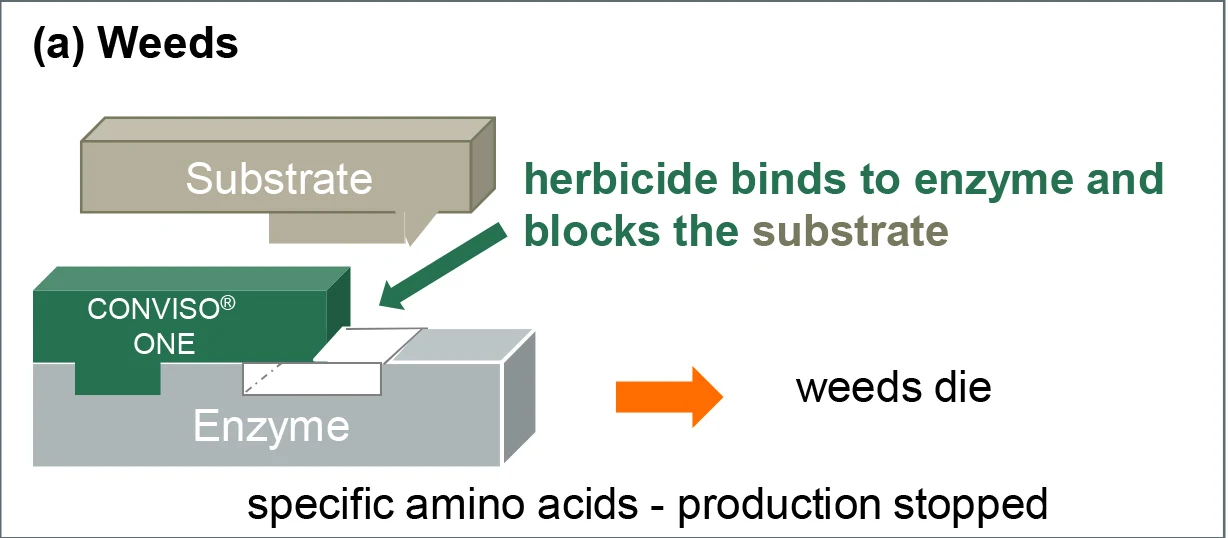

The recommended timing of application is when the weeds are at the two to four true leaf stage, but it can control weeds up to six true leaves depending on species. In most situations this will coincide with an application during crop growth stage 14 to 18, the four to eight true leaf stage.
In practice weeds rarely emerge at the same time or grow at the same rate so application timing should be determined by the growth of the dominant weed species for the field situation. In most instances this will be fat-hen as it, and other tall weeds, have the capacity to inflict serious yield penalties on sugar beet if left uncontrolled. Conviso One should be applied before fat-hen reaches four true leaves.
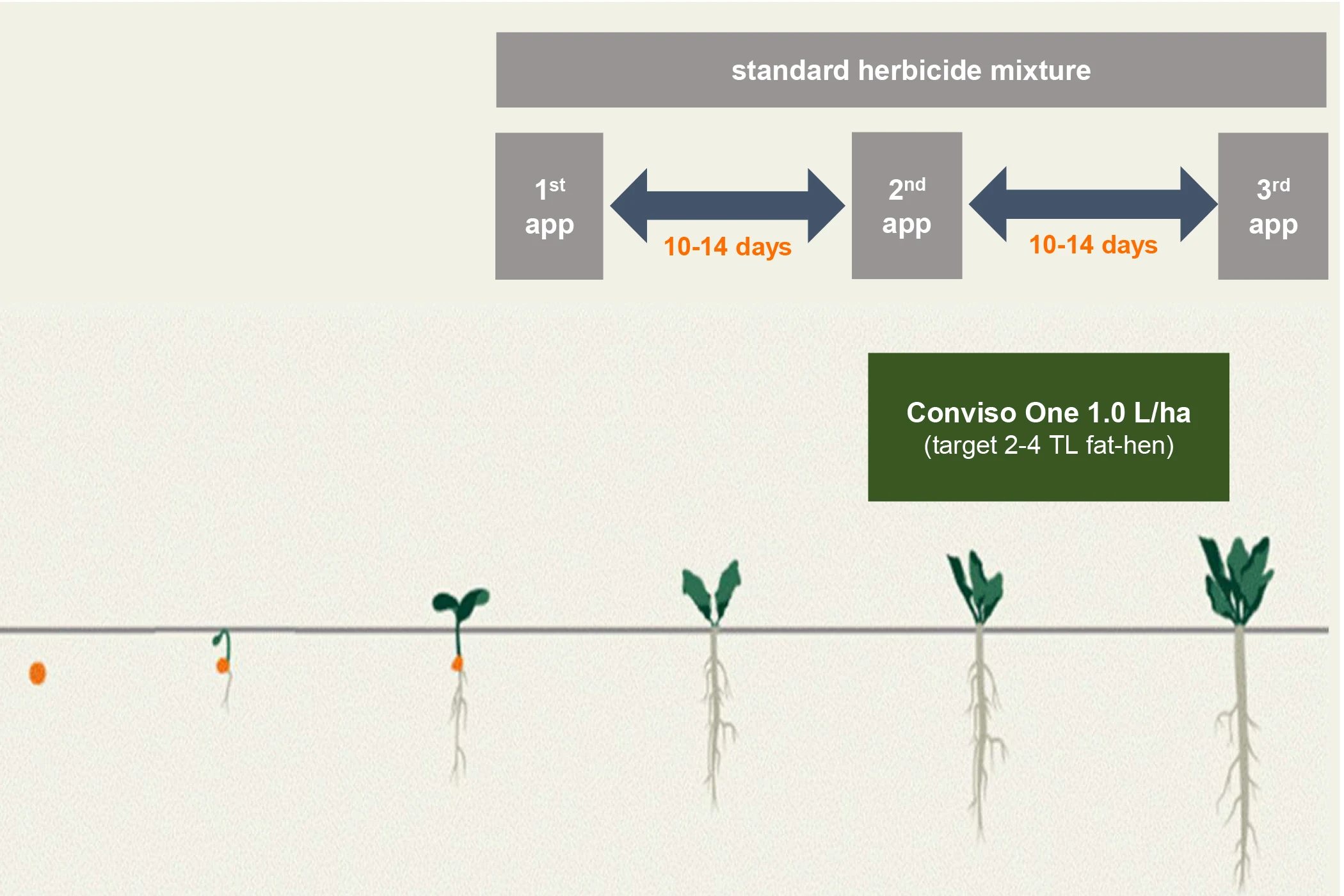
Optimum Conviso One spray timing
Following crops
There is a wide range of crops that can be sown following a crop of sugar beet that has received the Conviso One herbicide. In order to minimise the risk of crop damage from the residual effects of thiencarbazone, the active substance with lasting residual effect, there are however, several principles of good crop management that should be observed.
Best practice requires that ahead of all following crops the land should be mouldboard ploughed to a depth of at least 20 cm (8 inches) prior to sowing or planting. Where a beet crop fails or is abandoned, it is advisable to allow a month to elapse before re-sowing with a maize crop, even after ploughing.
It is expected that those intending to establish a crop in the same calendar year as the beet crop was sown will drill winter wheat as there are few alternatives that can be sown late in to the autumn and winter and be expected to deliver a respectable performance.
In the year after application, the following crops may be sown:
Maize
Peas
Sunflowers
Winter and spring barley
Winter and spring wheat
Ryegrass
If groundkeepers are found in the following crop, treat with a hormone herbicide such as MCPA and 2,4-D as these have been found to be effective against ALS-tolerant sugar beet.
Good record-keeping and a zero-tolerance approach to bolter management will be essential to preserving the Conviso Smart system for the long-term.
All growers will be asked to demonstrate the principles of good crop management:
Remove all bolters to prevent seed return thereby minimising the risk of ALS-tolerant weed beet
Follow herbicide guidelines as laid out by the Weed Resistance Action Group to protect the mode of action and promote the long-term performance of the active substances. A guide to managing weeds in arable rotations can be downloaded from the AHDB website.
Sow in whole field blocks
To reduce the risk to neighbouring crops, Conviso Smart varieties should be sown in whole field blocks. Sowing in part fields increases the risk of drift from ALS-tolerant varieties damaging non-tolerant varieties.

At sowing clean out the seed drill between changing between Conviso Smart and conventional varieties. Always record which fields are sown with Conviso Smart varieties and where possible clearly mark the field so as to ensure employees and contractors are aware that the field contains a variety tolerant to ALS herbicides. Ensure the sprayer is thoroughly cleaned out before moving to a crop not tolerant to ALS herbicides.
In practice conventional varieties will likely need spraying before and after the Conviso One herbicide is applied to Conviso Smart varieties. Time herbicide applications carefully for each crop to save time and reduce the risk of spraying non-ALS tolerant varieties with the Conviso One herbicide.
Bolter control
Choose varieties suitable for the intended drilling timing and sow at a time appropriate to the variety and the field. Adopt a zero-tolerance approach to bolters and plan to ensure all bolters are removed. A list of gang workers operating in your area is available from the British Sugar online portal. Effective bolter management often requires going through the crop several times to ensure full control.
Adhering to the principles of good crop management is central to ensuring target weeds do not develop resistance to the ALS active substances contained in Conviso One. These principles apply across the whole rotation.
Exploit a diversity of cropping based around both winter and spring-sown crops (including both monocotyledon and dicotyledon species)
Make effective use of cultivations, including inversion tillage, across the rotation to reduce weed pressure
Consider use of herbicides with non-ALS modes of action across the rotation to avoid over-reliance on a single chemical class
Apply appropriate combinations of active substances at an effective dose rate and at the correct timing to maximise efficacy against the target weed spectrum present
Adopt an integrated control programme across the whole rotation
Where necessary consider using conventional chemistry in sequence with Conviso One to ensure effective weed control. In situations where lower levels of efficacy are observed investigate the possible causes. If an area of weeds survive application and resistance is suspected, consider spraying-off the area with a non-selective herbicide.
Do not apply Conviso One in a tank-mix with other herbicides or in sequence with other ALS herbicides.